Would you look at that! It’s only Wednesday morning again. And by now we know what that means, don’t we? To wit, it’s time for another edition of the British Genre Fiction Focus, Tor.com’s weekly column dedicated to news and new releases from the thriving industry dedicated to speculative fiction that exists in the United Kingdom!
In the news this week: have you ever lost your faith in fiction? Ian McEwan has, and he has a surprising story to tell about how he got his groove back. We’ve also got British cover art for Neil Gaiman’s new novel; comments on Paul Kearney’s oncoming omnibus; details on an absolute gaggle of interesting acquisitions; and talk of Sherlock Holmes and James Bond both.
As to this week’s new releases, prepare yourselves for the return of Phillip Mann, more from Majipoor, the debut of an exciting series set in a vertical city, and a super-sounding fantasy featuring teeth—and claws while we’re at it. All that and so much more… coming up after the read more!
Faith in Fiction
I have an admission to make: I burn out on books with alarming regularity.
A large part of the problem is what I choose to do with my days. I’m incredibly fortunate insofar as I have a lot of leeway as regards the reviews I write, but we all make mistakes, don’t we? And every now and again I’ll make a dodgy decision.
I’ll offer, in my innocence, or ignorance, to cover something that turns out to be—I’ll be blunt—bloody rubbish, and much as I’d love to declare an end to these reading experiences then and there, I don’t allow myself such luxury. I refuse to review a book unless I’ve seen the whole thing through, so when I make a bad choice, I have to live with the consequences. And if I’m honest, they can be torturous.
This isn’t exclusively a problem for reviewers. Far from it, in fact. I’m sure we’ve all lost our love of literature for periods in the past—be it because of bad books, new responsibilities, conflicting commitments, or other interests—but obviously, you’ve gotten your passion back. Why else would you be here, reading this?
If that’s the case—and feel free to disagree with me—then Ian McEwan’s recent diatribe should strike a chord with every one of us. Here’s how it starts:
Like a late Victorian clergyman sweating in the dark over his Doubts, I have moments when my faith in fiction falters and then comes to the edge of collapse. I find myself asking: am I really a believer? And then: was I ever? First to go are the disjointed, upended narratives of experimental fiction. Ach well … Next, the virgin birth miracle of magical realism. But I was always low church on that one. It’s when the icy waters of scepticism start to rise round the skirts of realism herself that I know my long night has begun. All meaning has drained from the enterprise. Novels? I don’t know how or where to suspend my disbelief. What imaginary Henry said or did to non-existent Sue, and Henry’s lonely childhood, his war, his divorce, his ecstasy and struggle with the truth and how he’s a mirror to the age—I don’t believe a word, not the rusty device of pretending the weather has something to do with Henry’s mood, not the rusty device of pretending.
What follows is an inspiring insight into what McEwan calls “the one true faith,” which is to say the literary life the likes of us live.
The Guardian has the rest of the article, and I’d say it’s required reading. Spoiler alert: it has a happy ending, quite utterly unlike almost everything the acclaimed author—who I like to remind people began his career writing grotesque horror novels—has published in recent years.
The essay also raises an excellent question. I’ll let you find out for yourself what it is that finally brings McEwan back to the fold, but for me, it’s always been Stephen King. I very rarely re-read anything—there’s always so much that’s shiny and new to attend to!—but when my reading habits have hit rock bottom, there’s nothing else for it than another summit of The Stand, or Different Seasons if I need a quick fix.
Short stories can be a real boon in these times too. Hence the other column I contribute to Tor.com.
Anyway, enough about me… I want to know what you read when you’ve fallen out of love with literature!
The Cover Art at the End of the Lane
It’s been a long time since there was a new Neil Gaiman novel to look forward to. So long that sometimes I can’t believe The Ocean at the End of the Lane is only a few months away, in the US and the UK.
In this case, though, I think it’s safe to say: absence doesn’t half make the heart grow fonder, hey? Between The Ocean at the End of the Lane and River of Stars—not to mention NOS4R2, Doctor Sleep, The Shining Girls, and so many others that I can’t hope to do them all justice in a single sentence, try as I might—2013 already feels like an extraordinary year for genre fiction fans, and we’re only eight weeks in.
Anyway, I have two good reasons for banging on about Neil Gaiman today. The first is the news that he’ll be appearing as keynote speaker at the 2013 Digital Minds Conference, which is but a pea-sized part of this April’s London Book Fair.
I don’t know if this makes it more or less likely that he’ll visit the incredible Fringe Festival in Edinburgh to celebrate the release of his new novel, but speaking as a Scotsman, based about as far away from London as you can get without leaving the UK, my fingers are firmly crossed.
But let’s get back to The Ocean at the End of the Lane. You thought the North American cover art was awesome, obviously—and it is. But get a load of this, folks!

What a wonderful arrangement. Striking. Suggestive. I’d go so far as to say stunning.
Though it is ever so slightly Nevermind-y, isn’t it?
If you want to torture yourself some more, here’s a reminder of what The Ocean at the End of the Lane is all about:
The Ocean at the End of the Lane is a novel about memory and magic and survival, about the power of stories and the darkness inside each of us.
It began for our narrator forty years ago when he was seven: the lodger stole the family’s car and committed suicide in it, stirring up ancient powers best left undisturbed. Creatures from beyond the world are on the loose, and it will take everything our narrator has just to stay alive: there is primal horror here, and a menace unleashed—within his family, and from the forces that have gathered to destroy it.
His only defense is three women, on a ramshackle farm at the end of the lane. The youngest of them claims that her duckpond is an ocean. The oldest can remember the Big Bang.
The Ocean at the End of the Lane is a fable that reshapes modern fantasy: moving, terrifying and elegiac—as pure as a dream, as delicate as a butterfly’s wing, as dangerous as a knife in the dark.
Headline Books are bringing The Ocean at the End of the Lane to Britain on June 18th, day and date with its publication in the States.
I can hardly wait. Can you?
Acquisitions Ahoy!
Now there have been a whole bunch of sweet-sounding new books making waves since the last time we did this thing, so let’s rattle through a few.
To begin with, Transworld have bought three fantasy novels by debut author Erika Johansen. Says Editorial Director Simon Taylor of the acquisition:
“At Transworld, we set great store by the in-house enthusiasm a story generates, and the response I received from colleagues to The Queen of the Tearling was immediate and nothing short of rhapsodic… On the evidence of her devour-in-two-sittings debut, Erika Johansen is a born storyteller, and she’s written a novel that is both gratifyingly full of classic fantasy tropes but also doing something intriguing, thrillingly different.”
Bantam Press will bring The Queen of the Tearling to Britain not this summer but the next one. So it’s ages away. A shame!
I’d say the same about The Almost Girl by Amalie Howard, which is coming in spring 2014 from Strange Chemistry:
The Almost Girl is a richly imagined story of defiance, courage, and heart. It is the tale of a girl who finds her own way on her own terms, a girl who won’t let what she is define her, and a girl who will sacrifice everything she is for the ones she loves. It is a story of someone who eclipses her predestined fate to become something more… something extraordinary.
In the meantime—and in an item shall we say romantically related to last week’s Choose Your Own Erotic Adventure—there’s always The Submissive Trilogy, which began as fan fiction inspired by The Twilight Saga.
A familiar story, no?
And by the sounds off it, Headline are getting behind these books in a big way. All three volumes will be released this calendar year, beginning with an e-book edition of The Submissive this month, and the publishing house’s Managing Director says that “This is the series, and Tara Sue Me the author everyone is going to be talking about in 2013.”
You have been warned.
Meanwhile, Angry Robot Books have signed Tim Waggoner, author of the noirish Nekropolis novels, for the first two books in a completely new series:
It’s Men In Black meets The Sandman as Tim invites you to meet the fine men and women of the NightWatch: a supernatural agency dedicated to hunting down rogue nightmares that escape from other realms when people dream about them, while ensuring that other dream-folk are allowed to live among the regular, human population… as long as they play by the rules.
The first book in the series—Night Terrors—will be published in the summer of 2014, with a follow-up volume scheduled for early 2015.
Last but by no means least, Orbit Books have reached an agreement with self-publishing success story David Dalglish whereby they’ll release a trio of his gritty genre novels in quick succession.
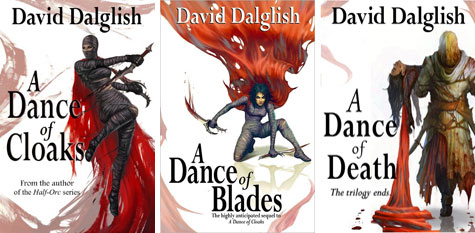
Per the press release:
A dark, gritty epic fantasy, the Shadowdance series is a character-driven tale of assassins, thieves, and treachery. The series begins when Aaron Felhorn—the son of the greatest assassin of the age—is sent to kill the daughter of a priest, but instead chooses to protect her.
A Dance of Cloaks is coming to the UK and the US this October. A Dance of Blades and A Dance of Death will follow in November and December respectively.
I really rather like it when publishers do this sort of thing, don’t you?
Collecting Kearney’s Kingdom
For me, 2012 was the year of Paul Kearney.
I had been aware of his work beforehand, of course, having enjoyed the first of the five short volumes comprising The Monarchies of God, but it was the arrival of a review copy of Kings of Morning that really laid the foundations for my abiding interest in the aforementioned author.
Almost entirely idly, I perused a few chapters of it whilst waiting to go to work one day, only to find myself distracted by thoughts of the novel all through the classes I was teaching that evening. This was awfully irresponsible of me; I had deadlines to attend to, and many more lessons to plan. Plus, I’m a stickler for starting series at the start, and Kings of Morning was the concluding volume of a trilogy I had next to no knowledge of.
But I simply couldn’t shake the impression Kearney had made on me in those stolen moments… so I resolved to nick a number of others. When I finally got home that night, I picked optimistically through the boxes of books I can only consider overspill, and it looked like lady luck was with me: I owned copies of The Ten Thousand and Corvus already.
I did little other than read that week.
So it began. It ended—for the time being at least—with a review of Kings of Morning here on Tor.com, and a nod in the Reviewers’ Choice round-up I contributed to. Long story short, The Macht Saga is remarkable. Everyone with the slightest interest in fantasy fiction should read it immediately.
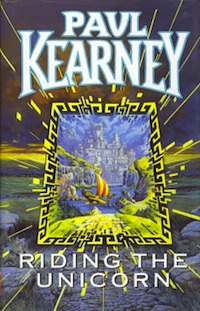
Tempted as I was to consume Kearney’s complete backlist afterwards, I contended myself with a second-hand copy of his incredible 1992 novel, A Different Kingdom, and otherwise held my horses. At the time, I didn’t think I’d be made to wait for much longer, because there’d been talk of an oncoming omnibus edition both collecting and completing his previous series, The Sea Beggars.
Sadly, that still hasn’t happened. But something else has, and it’s almost as awesome.
Last week, John Jarrold revealed that Solaris will be releasing an alternate omnibus in early 2014. The collection, which is still to be titled, will bring together Kearney’s first three novels—respectively The Way to Babylon, A Different Kingdom, and Riding the Unicorn—under a single cover.
When reached for comment, the author had this to append to the press release:
All I would say about the three books of the omnibus is that they are very autobiographical. I did fall off a mountain on Skye, as Riven did in Babylon, and I stayed in the Camasunary bothy. The farm in Kingdom is a faithful portrayal of my grandparents’, and they are characters in the book. I spent days tramping across the North York moors.
Also, Kingdom is still the best thing I’ve ever written.
As to that, I dare say we’ll have to agree to disagree—The Ten Thousand has held faster to my heart—but be that as it may, Paul Kearney remains one of the most criminally underrated authors working in the genre today, and I can only hope this book charting his earliest efforts helps cement him as such.
Now then. How about a few new releases?
As has become my habit, we’ll begin our look at what’s to come this week with a book I overlooked last time.
NEW RELEASES

Mastermind: How to Think Like Sherlock Holmes, by Maria Konnikova (February 17, Canongate)
What is it that separates Sherlock Holmes from his long-suffering friend and side-kick Dr John Watson? What makes Holmes such a superior detective, able to piece together clues and solve problems that seem elementary to Watson only in hindsight? And can we—most of us Watsons ourselves—ever harness a bit of Holmes’ extraordinary powers of mind, not to solve crimes, but simply to improve our lives at work and home?
The answer is yes, and in “Mastermind,” psychologist Maria Konnikova shows us how.
Using plots and passages from the wonderfully entertaining Holmes stories, she illuminates how Arthur Conan Doyle’s detective embodies an ever-present mindfulness, and how this active mental disposition proves foundational to his success. Beginning with Holmes’ concept of the “brain attic”—a metaphor for the information we choose to store in the mind and how we organise our knowledge, Konnikova unpacks the mental strategies that lead to clearer thinking and deeper insights. Moving through principles of logic and deduction, creativity and imagination, “Mastermind” puts 21st century neuroscience and psychology in service of understanding Holmes’ methods. With some self-awareness and a little practice, we can all employ these methods to develop better strategies, solve difficult problems and enhance our creative powers.
Writing for Holmes fans and casual readers alike, Konnikova has translated what so many of us love about the great detective into a remarkable guide to upgrading the mind.
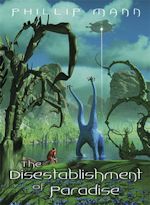
The Disestablishment of Paradise, by Phillip Mann (February 21, Gollancz)
Something has gone wrong on the planet of Paradise.
The human settlers—farmers and scientists—are finding that their crops won’t grow and their lives are becoming more and more dangerous. The indigenous plant life—never entirely safe—is changing in unpredictable ways, and the imported plantings wither and die. And so the order is given—Paradise will be abandoned. All personnel will be removed and reassigned. And all human presence on the planet will be disestablished.
Not all agree with the decision. There are some who believe that Paradise has more to offer the human race. That the planet is not finished with the intruders, and that the risks of staying are outweighed by the possible rewards. And so the leader of the research team and one of the demolition workers set off on a journey across the planet. Along the way they will encounter the last of the near-mythical Dendron, the vicious Reapers and the deadly Tattersall Weeds as they embark on an adventure which will bring them closer to nature, to each other and, eventually, to Paradise.
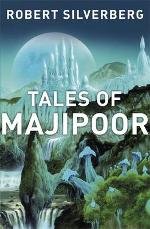
Tales of Majipoor (Majipoor Cycle #8), by Robert Silverberg (February 21, Gollancz)
From one of the masters of SF comes this new collection of stories, all set on his most famous creation: Majipoor.
A massive world of adventure, romance and danger, Majipoor is a place where dreams can soothe the restless or flay the minds of the guilty. Where humans, aliens and natives live in a shifting, uneasy alliance and where two great men rule over all, for no matter who bears the title, there is always a Coronal and a Pontifex, forever miles apart, forever striving to maintain the balance of their far-flung civilisation.
Here, collected for the first time, are the final tales of Majipoor. From the earliest legends of the Shapeshifters to an untold mystery late in the reign of Valentine Pontifex, the seven stories in this collection expand upon and flesh out the remarkable world that Robert Silverberg has created. Spanning a decade of writing from one of the masters of science-fiction, this collection is both a fantastic introduction for those new to Majipoor and a welcome return for those who have visited before.

Tooth and Claw, by Jo Walton (February 21, Corsair)
A family of dragons gathers on the occasion of the death of their father, the elder Bon Agornin. As is custom, they must eat the body. But even as Bon’s last remains are polished off, his sons and daughters must all jostle for a position in the new hierarchy. While the youngest son seeks greedy remuneration through the courts of law, the eldest son—a dragon of the cloth—agonises over his father’s deathbed confession. While one daughter is caught between loyalty to her family by blood and her family by marriage, another daughter follows her heart—only to discover the great cost of true love….
Here is a Victorian story of political intrigue, family ties and political intrigue, set in a world of dragons—a world, quite literally, red in tooth and claw. Full of fiery wit, this is a novel unlike any other.

Encounters with Sherlock Holmes, edited by George Mann (February 22, Titan Books)
A brand-new collection of Sherlock Holmes stories from a variety of exciting voices in modern horror and steampunk, including James Lovegrove, Paul Magrs, Cavan Scott, Richard Dinnick, Nick Kyme, Mark Hodder and Eric Brown, amongst numerous other authors.
Encounters with Sherlock Holmes is edited by respected anthologist George Mann, and includes a story by the Mann himself.

Supernatural: Fresh Meat (Supernatural #11), by Alice Henderson (February 22, Titan Books)
After Sam and Dean Winchester lost their mother to a mysterious supernatural force as young children, their father taught them how to hunt and destroy the paranormal evil that exists in the dark corners of America. Following their father’s demonic death, they discovered that they are descended from a long line of hunters and chose to continue their mission.
A rash of strange deaths in the Tahoe National Forest bring Sam, Dean and Bobby to the Sierra Nevada mountains to hunt a monster with a taste for human flesh. Soon walking corpses, bodies with missing organs, and attacks by a mysterious flying creature lead the trio to a cunning and deadly foe which can assume a human form and will do anything to survive. When a blizzard strikes the area, and not knowing who they can trust, they must battle not only the monster, but also the elements to survive.

Beauty Awakened (Angels of the Dark #2), by Gena Showalter (February 26, Mira)
His name is Koldo. He is scarred, powerful, and he lives only for vengeance, determined to punish the angel who viciously removed his wings. But if he yields to the forces of hatred, he will be kicked from the heavens, eternally damned.
She is his last hope. Nicola Lane was born with a defective heart, yet this fragile human shows surprising strength as demons stalk her every move, determined to end her. She is the key to Koldo’s deliverance… and his downfall. Though he fights duty, destiny and his first addictive taste of desire, his toughest battle will be the one for Nicola’s life—even if he has to sacrifice his own….
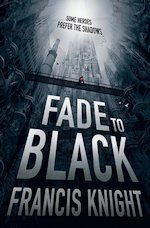
Fade to Black (Rojan Dizon #1), by Francis Knight (February 26, Orbit)
From the depths of a valley rises the city of Mahala.
It’s a city built upwards—where streets are built upon streets, buildings upon buildings. A city that the Ministry rules from the sunlit summit, and where the forsaken lurk in the darkness of Under.
Rojan Dizon doesn’t mind staying in the shadows, because he’s got things to hide. Things like being a pain-mage, with the forbidden power to draw magic from pain. But when the fate of Mahala depends on him using his magic, he can’t hide for ever.
POSTSCRIPT
That’s just about enough to be getting on with for one week, don’t you think?
But wait… there’s more!
To mark the 50th anniversary of Fahrenheit 451, Harper Voyager have tied up the rights to release digital editions of the late, great Ray Bradbury’s backlist. The birthday book is already available in the UK, alongside The Martian Chronicles and The Illustrated Man. More will follow shortly, including several that have never before been available electronically.
Meanwhile Jonathan Cape has unveiled a little more information about the new James Bond novel, written by Any Human Heart author William Boyd. It’s still untitled, but we do now know that it’ll be set in 1969, and released on September 26th. Save the date!
Waterstones, in the interim, have released details of the novels nominated for their annual Children’s Book Prize, and as ever, there are a fair few speculative contenders amongst the shortlists.
And finally, speaking on BBC Radio 4, HarperCollins CEO Victoria Barnsley has put an alarming proposition on the table: the idea that shops—like Waterstones—could charging shoppers a fee for the privilege of browsing their books, supposedly to turn the tide in the high street’s favour.
I’m sorry, say what?
But let’s leave that conversation for the comments! I’d also love to hear how you all go about coping with the woebegone book blues, vis-à-vis our earlier discussion of Ian McEwan’s essay. And hey, did any of this week’s new releases catch your eye?
Niall Alexander is an erstwhile English teacher who reads and writes about all things weird and wonderful for The Speculative Scotsman, Strange Horizons, and Tor.com, where he contributes a weekly column concerned with news and new releases in the UK called the British Genre Fiction Focus, and co-curates the Short Fiction Spotlight. On rare occasion he’s been seen to tweet about books, too.









